The key goals of all online marketers are to increase conversion rates and build strong, trusting relationships with the client, and social marketing today is a very powerful tool for achieving these goals.
But today the topic of our article will not only be the benefits of SMM: we will talk about the possibility of authorization on a site using accounts on social networks (social login or login through social networks).
Malware is a term that describes a wide range of programs that are installed on a user's computer, often through deception. Malware can spread quickly on a social network, infecting a user's computer and then spreading to his or her contacts.
Some common malware distribution methods include. This section describes some of the known methods. Phishing attacks are when emails, instant messages, or other messages from a trusted source request information. Some Internet browsers have taken steps to help identify fake websites. Spear phishing is a type of phishing attack that appears to be from a colleague, employer, or friend and includes a link or something that can be downloaded. These links or downloads may be malicious, such as viruses or fake websites that ask for personal information. Inclusion is misleading. A social network can use social engineering so that people feel compelled to join. one person joins and gives the social network access to his or her contact list. The social network then sends emails to all of its contacts, often implying that they belong to the person who joined it. Contacts are strongly encouraged to send money immediately. The attack can also be in the form of chat. There are many ways that social media information can be used for purposes other than what was intended for the user.
Authorization via social media not only simplifies the conversion process by giving the visitor the opportunity to enter the site without registering, but also gives the marketer access to a huge database user information posted on profiles on social networks.
But before you use this seemingly 100% effective approach to conversion optimization on your website, check out nine facts about social login that every marketer should know.
Keep in mind that these tips are not 100% effective. Every time you decide to participate in social media, you are taking a risk. Common sense, caution, and skepticism are some of the most powerful tools you have to protect. Use a strong password that is different from the passwords you use to access other sites. If you are asked to provide security questions, use information that others would not know about you. Never provide work related email on a social network, especially when registering. Consider creating a new address Email, strictly associated with your social network profile. Providing only the information you need or what you are comfortable with. When in doubt, err on the side of providing less information. The social network promises to connect a new user with others they already know online. To be safe, do not provide this information at all. There are some social networks that capture all of a user's email contacts and then ask them - often multiple times - to join. These messages may even appear from the original user. Ignore your real name, especially your last name. . General tips for use social networks.
1. Mandatory registration turns off 86% of users

According to a study by WebHostingBuzz, mandatory registration not only discourages users from converting at all stages, but also discourages them password fatigue- a feeling of irritation and fatigue that arises from the need to remember a huge number of passwords for various online accounts.
This information may be useful for thieves and data mining companies. A study from Carnegie Mellon University found that Social Security numbers can be predicted based on publicly available information, including your birthday, age, and place of birth. Additionally, some social networking sites allow you to show your month and birthday but hide the year. Do not give out your birthday, age or place of birth. . Here's what each of them does and why you won't want to use them.
And this is not surprising: the average Internet user uses from 7 to 30 different login and password combinations, and the need to create and remember another one will not please him at all.
A 2012 survey by Blue Research found that 54% of people are likely to leave a website that requires registration and find another resource that doesn't force them to create an account. new account for authorization.
This makes it so that websites don't have to worry about keeping your password and username secure. 
They don't get keys to the house, they just know where the door is. However, in other cases, you also give apps and web applications access to your data. Calendar apps, address books, music services, and anything that uses your social network to provide news usually do this. dangerous, but they have the potential to cause irritation.
But the biggest irritants to mandatory forms are the younger demographic, who know they can log in via Twitter or another social platform and get very annoyed if a site doesn't have that option.
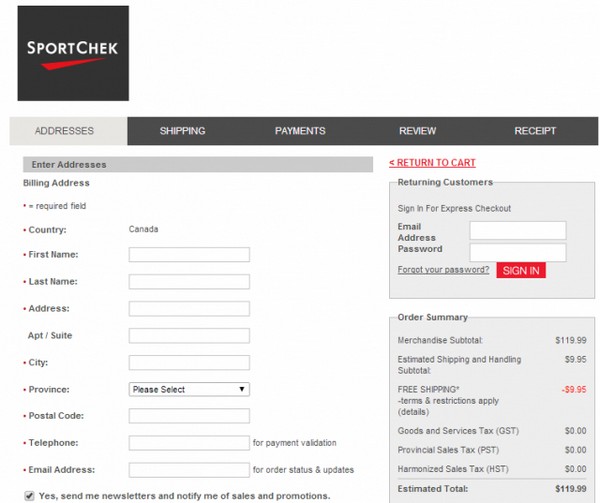
Although this registration form is designed correctly, having 10 fields to fill out will negatively impact the user experience
Why You Don't Want to Use Your Social Media in Apps
Luckily, it's incredibly easy to see what these apps are up to and revoke your privileges. 
For example, a number of calendars require access so they can add birthdays and events. Checking your rights is very simple. This is a good idea, so get in the habit of checking this tab every time.

We always strive to increase conversion rates and encourage users to reach more customers. Advanced companies use a social login, also known as a social sign, to do just that. Not only can this improve the user experience on your site - no need to fill out a registration form or remember even more passwords - it also allows marketers to collect more accurate data, including verified email addresses, age, gender, relationship status and interests.
As you already understand, using social network profiles for authorization eliminates all of the above irritants for the target audience. If some fields of the registration form are extremely important for you, then give clients the opportunity to use both social login and standard registration to log into the site.
2. 77% of users find social login a good alternative to registration
It's clear that visitors need to interact with your site to achieve a conversion goal. But this can be hindered by long and confusing registration forms, which repel leads and cause them to leave for competitors.
If you're considering incorporating social login into your marketing strategy, take a look at my top nine things every marketer should know. Estimates of the average number of passwords users now have to remember range from 7 to 30, but we can assume that so-called “password fatigue” will only get worse.
The number of visitors directly correlates with revenue - no matter where you are located. Additionally, if your registration process may actually lead users to other websites, it would be wise to do everything you can to stop people heading to your competitors.
Using social media to log into a website allows people to log in in just a few steps and with little to no inconvenience.
But having a social login does not bring positive results to all companies, since much depends on the business niche and the age of the target group of a particular offer.
We know that older users, in particular, are more cautious about the information they share and are less likely to use social following. Take a look at the chart below. Some companies found that while social login significantly reduced the number of failed login attempts and password reset requests, engagement was not as high as expected.
Impressive, but considering that only 4% of their users signed up to use social login, they decided to customize their traditional registration form and remove their social login buttons. However, be warned that social login may not be the ideal choice for all businesses.
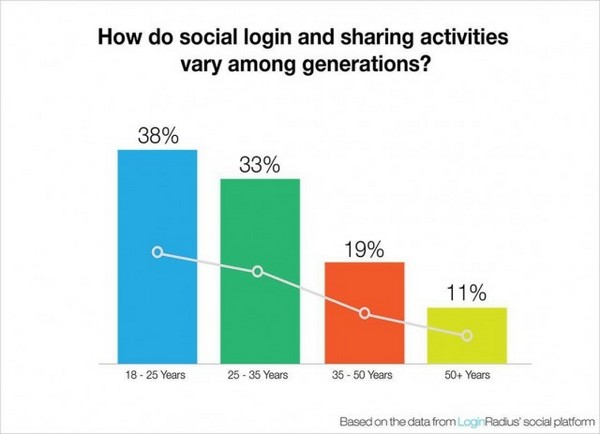
Statistics show that middle-aged and older online consumers are not inclined to use social media profiles to log into websites.
There is a clear trend: the older the user, the more concerned he is about his personal information, so standard registration on a website seems more safe option authorization.
The same goes for businesses operating primarily in countries where social media is blocked, such as China or Cuba. Finally, if you only want to offer guest checkout or use third-party checkout—and you're not interested in collecting user data—social login may not be entirely suitable for your business.
88% of users enter incomplete or incorrect data on registration forms
Of those users who don't want to sign up, most of them are probably missing fields or falsifying information. Programs that automatically detect irregular email addresses or incomplete dates of birth are popular and can prevent the flow of falsified data, but these are time-consuming and unpleasant processes that do not prevent consumers from voting with an evacuation key, and a header for a competitor if they can.
The type of business you operate also matters: According to the results of using social login, B2C companies benefit more from the option to log in via social platforms than B2B organizations.
For example, only 3.4% of clients of the popular B2B email newsletter service MailChimp used social media to log in.
Getting quality user data is essential for any online business, and a social login along with a registration form gives you access to verified email addresses and over 200 verified data points for each user.
It is important to note, however, that due to large quantity information transmitted through online social networks, the data describing user behavior is only as good as the methods used to collate and interpret it. Instead, you're better off joining the force through a social login.
Despite the fact that the number of errors when logging into the site decreased by 66%, MailChimp removed the social login option, leaving only the standard account creation option.
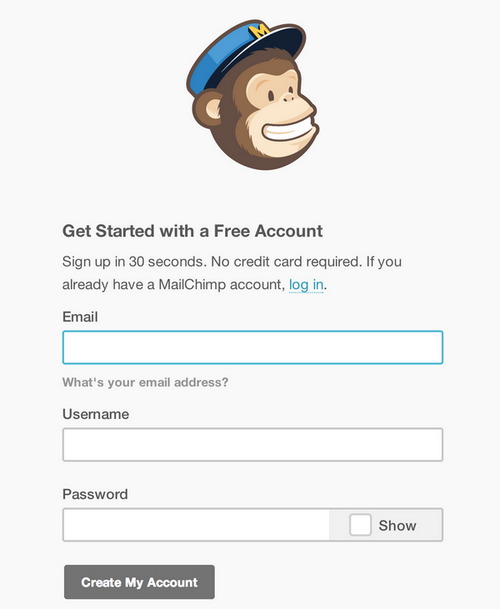
B2C business Easytobook, which provides hotel booking services, increased its customer activity rates by an impressive 68% after implementing the social login option.
We've all been directed towards content that we simply don't care about. Who hasn't received endless invitations to buy men's suits despite being a woman? Or offered a discount on a bikini wax despite being in an age group unlikely to engage in this type of cosmetic treatment?
Social login gives you access to much more information about your consumer base, allowing you to filter content based on their demographics, specific interests and personal circumstances. Basically, this allows you to personalize the user experience.
The company's resource received 1,500,000 unique visitors monthly, but the rate of their interaction with the site was extremely low. After authorization via Facebook became possible, using the site became significantly easier, and user activity rates increased noticeably.

In turn, most users will engage more with your brand and products because they know you offer what they want. Acquiring users with relevant content will allow them to spend much more time on your site.
However, it would be foolish to assume that absolutely every person has such high level personalization. Honestly, some people find it downright creepy. Remember, however, that they are likely the type of user who is less likely to sign up for a social network.
While consumer-facing companies benefit more from social login, B2B businesses should also consider using social login alongside regular registration.
3. 92% of users are more likely to leave a site than to recover a forgotten login and password

Selecting registration options means consumers are in control of how they want to interact with you. If you've managed to increase your signup and return rates, you now need to engage with users and encourage them to share and share your content.
Social sharing means you can reach a wider audience because users love sharing content online. However, since any marketing campaign must be properly thought out to ensure it does not cause harm, website owners need to think carefully about what they share and how they share it.
One third of 92% of users who stop using the site, having forgotten their login and password, most often do just that. Of course, the ability to log into a site through social networks could solve the problem of forgotten login data, but simply having such a login option is not enough to retain users and increase conversions.
For example, for an online store run by people over 55 years of age, authorization via VKontakte will not bring practically any results: firstly, older people rarely use social media, and secondly, they are afraid to give access to personal information.
It also makes no sense to use social authorization if the business operates in countries where residents do not use social platforms: in China and Cuba, for example, they are completely prohibited.
If you are not interested in receiving user information or provide customers with only a guest payment option, then using social authorization also does not make sense, and using a simple payment form will be enough.
4. 88% of clients provide incorrect information when registering
A 2013 study by Harris Interactive & Janrin found that 74% of consumers get very annoyed when the recommendations they see on a website don't match their interests. But how can marketers personalize recommendations and improve customer experience if only 12% of users complete review forms correctly?
Analyzing data registration forms, companies risk receiving incorrect information about the target audience. In addition, long and confusing lead forms irritate customers, so it is not recommended to use more than 5 fields: each extra one reduces the conversion rate to a lead by 17%.

The picture shows how eliminating unnecessary form fields increased the conversion rate from 5.4% (Before) to 11.9% (After)
To verify user data, many companies either send users an email with a link to confirm registration, or use various programs, identifying incorrect dates of birth and email addresses.
Correct information about the target audience is critical for business development, and authorization through Odnoklassniki and other social networks is great way obtain accurate user data.

The image highlights the user data that marketers can obtain from various social networks.
It is important to note that the flow of information on social networks is enormous, and therefore the data obtained through social authorization is not always completely accurate. Their correctness largely depends on software, which is used to collect and analyze data from user profiles.
Obviously, a woman who received a discount on men's tracksuits and a man invited to a free waxing of his bikini area will be very irritated by such offers.
The best way to avoid these types of mistakes is to develop personalized marketing campaigns based on the accurate information your prospects have posted on their social media profiles.

Social analytics provides highly personal customer data, while web analytics provides site statistics
The vast majority of consumers enjoy receiving personalized content from a business: it strengthens their connection with the brand and increases their affinity for it. But some people are intimidated by the fact that companies have such precise information about them.
To satisfy customers with different needs and beliefs, give them the opportunity to choose between two authorization options: creating an account and logging in through a social network profile. This way, clients will be able to decide for themselves how much information about themselves they are willing to provide.
6. 78% of people spread information about a product/service they like on social networks
In addition to the authorization form, you should also not forget about the usefulness of buttons for disseminating information on social networks.

Facebook's famous "Like" and repost buttons, for example, are viewed more than 22,000,000,000 times on 7,500,000 sites every day. One can only imagine how much content users share on social platforms every day.
The presence of buttons on the site for disseminating information will give users the opportunity to share with friends interesting content and information about good goods, and many new clients will come to you. The most important thing is to monitor what content you share and what people are saying about you on social media.
American Apparel, for example, offered a 30% discount to victims of Hurricane Sandy, inviting people to "go shopping if they're too bored during the storm." The inappropriate shopping call drew criticism on Facebook and Twitter, after which the company deleted the unfortunate tweet and publicly apologized.
Don't make the same American Apparel mistakes and keep an eye on social media for information related to your business.
7. More accurate information = better marketing decisions
“The Holy Grail of Marketing: Capturing value from every prospect by identifying those who are most likely to buy and influencing the perceptions of those who are likely to defect.”
— Dr. Eric Siegel
Analysis of reliable customer information gives marketers the opportunity to most accurately meet the needs of the target audience, monitor popular trends among consumers and predict their impact on product demand in the future.
The company will be able to create the most efficient business model, and the excuse “we just don’t know what our customers want” will no longer be relevant.
But the main problem of half of Internet entrepreneurs is not that they do not know their potential clients, but that they do not seek to know them at all.
Pivot conducted two surveys, the respondents of which were SMM specialists.

In the first study, marketers were asked whether they ask their subscribers what benefits they want to receive from connecting with a brand on social media: 34.8% of specialists answered positively to this question, the majority of respondents (53%) gave a negative answer, and 12.2% of online marketers didn’t even know what to answer.
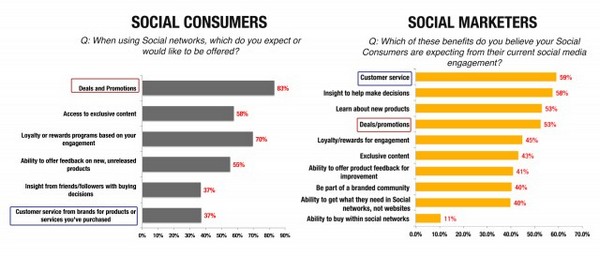
The results of the second survey showed that Internet marketers are completely unaware of the preferences of their target audience: most specialists consider quality service a priority for their clients, but for consumers this aspect is the least important.
In fact, buyers are most interested in unique discounts and promotions, which marketers have ranked only in fourth place in importance.
Social media provides the opportunity to conduct a variety of surveys and receive customer feedback, which can be used to create the most effective marketing campaign and customer retention strategy. By not taking advantage of these benefits, professionals are missing out on the enormous benefits of social marketing.
What can bring more sales than word of mouth marketing? Probably every marketer dreams of consumers actively sharing information about his company’s products with their friends on social networks.
Attracting new customers through referrals from existing customers not only costs a business much less, but also increases its ROI.
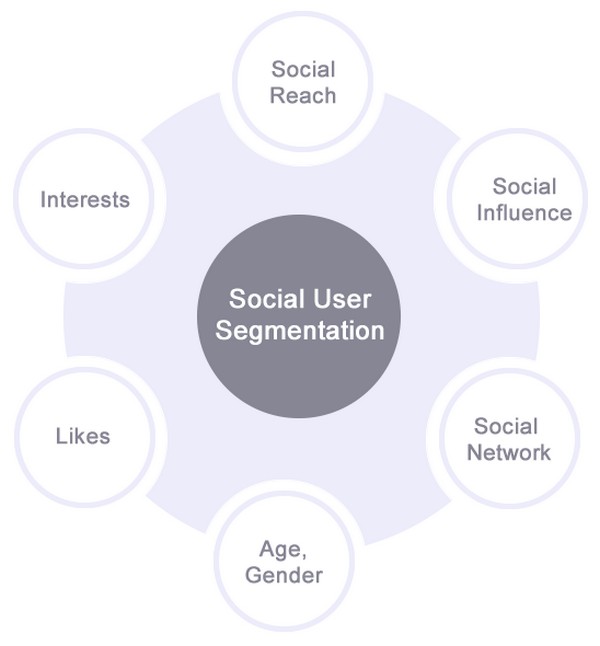
- interests;
- "likes";
- age and gender;
- social platform used by the client;
- influence;
- number of friends and subscribers.
Using social authorization on a website allows you to go a step further by giving users the ability to invite their friends from social media to visit the site or read interesting content. Such referral marketing brings companies more new customers than even the most talented team of marketers could find.
But by actively interacting with consumers on social networks, a business attracts the attention of a huge audience, so hundreds of thousands of people can learn about poor-quality service and problems with the product.
Take, for example, the case of a United Airlines customer who saw his guitar smashed by airport workers. The musician’s requests for compensation and threats to make a music video about the airline’s terrible service were ignored by all representatives of United Airlines, which they later greatly regretted.
The funny video went viral, garnering over 14,000,000 views on You Tube. But the victim did not stop: the musician recorded another song, published a book, created a website to collect complaints from dissatisfied customers of various companies, and is currently recording a third song.
United Airlines compensated the musician for the damage, but they are unlikely to be able to regain their positive reputation.
Provide your clients best service so that viral content about your business is exclusively positive.

“We have no choice whether to use social marketing or not. All that depends on us is how well we use it.”
— Erik Qualman
To maintain its position in the market and develop, a business must adapt to changes in the needs of its customers and predict possible variations in demand in the future. Well-known Nokia and Blackberry, for example, did not follow popular trends in their time mobile market, which cost them the loss of leadership in their niche.

Blackberry's expected losses in the second quarter of 2013 are $995,000,000
Many marketers believe that social media is just a temporary trend that will decline in popularity and effectiveness over time. According to one of the leading experts in online marketing, Pratik Dholokiya, the decrease in the use of social networks by citizens of the United States and Great Britain is the first signal that SMM marketing will soon lose its effectiveness.
Pratik believes that fears for his safety and universal accessibility personal information will be the main reasons why people refuse to use social platforms. Although a skeptic, the marketer still does not call for a complete abandonment of social marketing, emphasizing that its effectiveness depends solely on the business niche.
"You can segment your target audience interests and commercial intent, so instead of trying to please everyone, focus on your prospects and marketing niche.”
Instead of a conclusion
The conclusion from this material can be drawn as follows: the effectiveness of an SMM campaign should depend not only on the attractiveness of the headlines of your posts. The goal of an effective advertising campaign is to attract new quality leads, ignoring already registered users, regular customers and people whose profiles are not similar to the psychological portrait of your potential buyer.
To create such a campaign, a combination of social authorization with other effective SMM tools (Facebook Retargeting, for example) is perfect.
Remember to test all your hypotheses to find approaches and technologies that work for you.
High conversions to you!
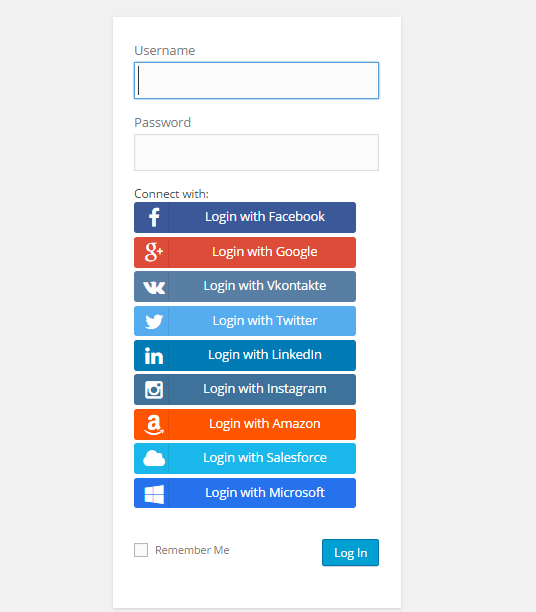 |
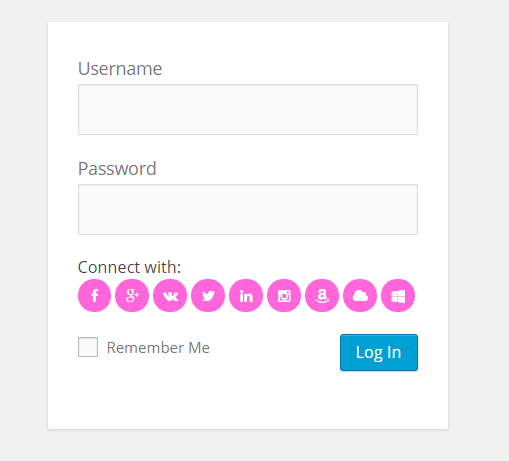 |
Install the plugin - Social Login, Social Sharing by miniOrange you can directly from the WordPress admin panel. Go to the page: Plugins - Add New, enter the name of the plugin in the search form, press Enter, install and activate the plugin.

After installing and activating the plugin, go to the page: miniOrange Social Login, Sharing. To connect the plugin you need to register on the miniOrange website, to do this, click on the tab - Register or Login with miniOrange. Or you can register on the plugin settings page. Enter your data into the form, your name, phone number, password twice and click on the button - Next.

After registration, go to the Social Login page (in top menu). Here you can configure the display of social networks on the login page.
— Customize Login Icons, here you can configure appearance social network icons.
— Customize Text For Social Login Buttons/Icons, You can specify the text that will be displayed above the login form and above the social buttons.
— Customize Text to show user after Login, You can customize the text that will be displayed to the user after logging in.
— Display Options display options.
Select the options where you want to display the social login icons, choose where social media icons will be displayed.
Redirect URL after login , you can configure redirect redirection after login.
Enable Logout Redirection, you can configure redirection after logout.
— Registration Options By default, registration via social networks is enabled.
Registration disabled message , message about disabled registration.
— Click on the button— Save to save the settings.

Additional functions:
— Social Comments, You can set up commenting via social networks.
— Licensing Plans Here are the plugin rates. With the free plan, you can use the Social Login feature for the first 30 days free of charge.
